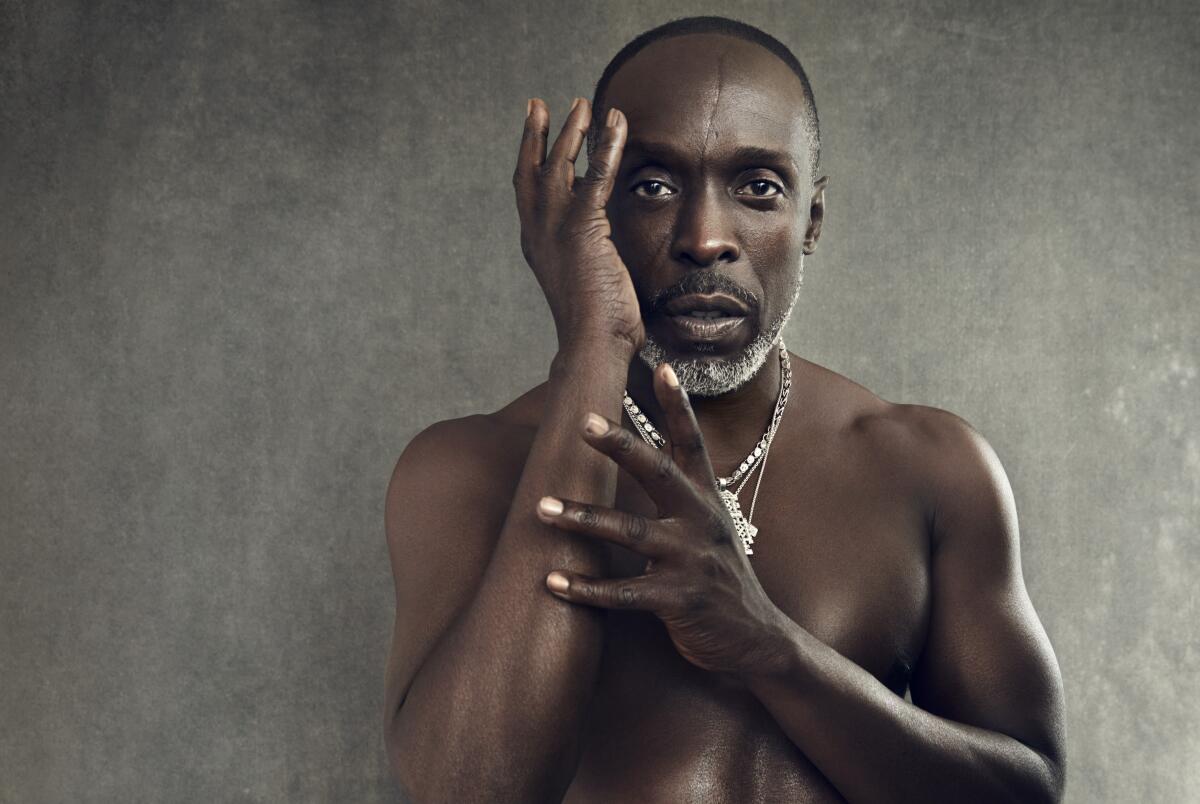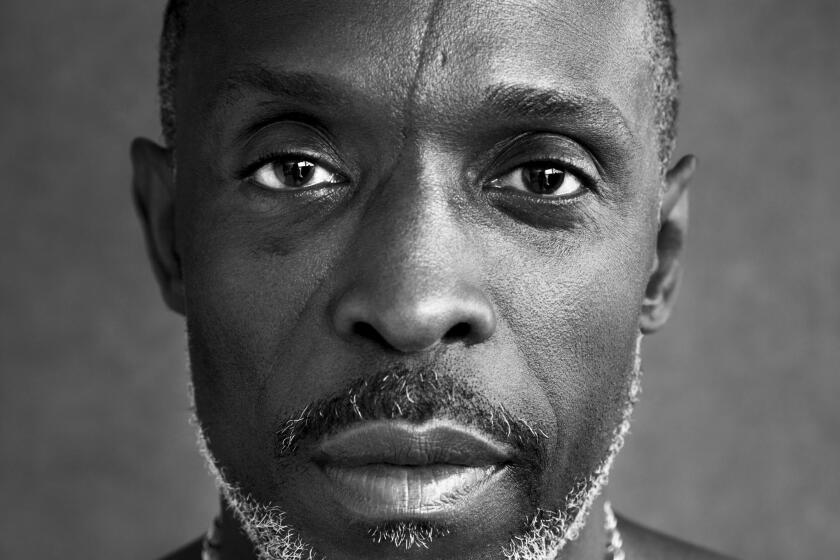Michael K. Williams dies; ‘The Wire’ actor was poised to win his first Emmy

Less than two weeks before he was to learn if he’d won his first Emmy Award, “The Wire” and “Lovecraft Country” actor Michael K. Williams has died.
Williams, 54, was found dead in his Brooklyn apartment Monday, a New York Police spokesman told The Times. Williams’ death was being investigated as a possible drug overdose, according to the Associated Press, citing police.
“His death is an ongoing investigation. The medical examiner will determine cause of death,” the police spokesman told The Times, declining further comment.
Critics and fans adored Williams for his work as a drug-money Robin Hood named Omar Little on “The Wire” and as Chalky White in “Boardwalk Empire,” but the actor had not yet won an Emmy after four previous nominations. In his most recent project, HBO’s sci-fi/horror series “Lovecraft County,” Williams played the alcoholic father, Montrose Freeman.
HBO issued a statement Monday that mourned the loss of “a member of the HBO family for more than 20 years.”
“While the world is aware of his immense talents as an artist, we knew Michael as a dear friend who was beloved by all who had the privilege to work with him,” the company said. “We send our deepest condolences to his family for this immeasurable loss.”
In a late August interview with The Times, Williams was characteristically humble about his work, instead focusing on the 17 other Emmy nods that “Lovecraft Country” had received.
The beloved star of “The Wire” and “Lovecraft Country” graciously sat for portraits revealing the range of emotion — and the honesty — fans loved.
“I was very, very happy to see the writers get their just due. The show was in the works for three years, being written and rewritten and rewritten,” Williams said. He went on to praise Jonathan Majors and Jurnee Smollett (nominated for lead actor and actress, respectively) and add that he “was very happy Aunjanue got her flowers,” a reference to Aunjanue Ellis, nominated for supporting actress.
“Lovecraft Country” was canceled after a single season, but Williams told The Times he could have kept working on the show for years to come.
“I was very shocked we did not get a second season, but I firmly believe that nothing is by chance,” said Williams, whose previous Emmy nods were not for “The Wire” but for “When They See Us,” “Vice,” “The Night of” and “Bessie.”
He said the cancellation of “Lovecraft Country” had proved to be its own narrative, and he pointed out how this “little one-season show with 18 nominations” broke ground even without the benefit of a second season.
“The horror genre is American classical storytelling. We’ve been telling horror stories since the beginning of Hollywood, and the only time you see people of color, we’re just the easy prey. It’s never about our relationship to what is horrifying. The Black person always dies within the first 10 minutes,” he said, agreeing with co-star Smollett’s comment that “as a Black artist you can be a fan of horror, but horror hasn’t always been a fan of us.”
Williams was born the youngest of 10 children in Brooklyn on Nov. 22, 1966, and raised in Vanderveer Projects in East Flatbush, N.Y. He began his career as a backup dancer for pop stars including George Michael and Madonna. He started acting after being discovered by rapper Tupac Shakur, who cast him in the 1996 film “Bullet.”
“I bring music into everything,” he told The Times. “All my characters have playlists. I use music on the set to [block] out the noise and to keep me in the zone. I got that from my dance background and bring it into everything I do as an actor.
“People would think I’m listening to period music to get into it, but it’s a very personal experience to me. It’s very personal how I pick music and how it breathes life into the character.”
Williams became known for his remarkable range as an actor and for his distinctive facial scar, the result of being slashed with a razor blade during a bar fight on his 25th birthday.
Williams was open about his struggle with drugs over the years and spoke in various interviews about being addicted to cocaine while working on “The Wire.” Before his breakout turn in that show, Williams was cast in guest appearances on “The Sopranos” and “Law and Order,” among others.
With “The Wire,” Williams earned acclaim as one of the great character actors of our time. His portrayal of Little, a fearsome Baltimore street criminal notorious for robbing drug dealers, won over a loyal fan base during the show’s run from 2002 to 2008. Williams’ ability to infuse a violent offender with tenderness and pathos cemented his status as a beloved actor, as did his sensitive portrayal of an openly gay man.
In addition to his TV work, Williams appeared in films including “12 Years a Slave” and “Assassin’s Creed.”
Reaction to Williams’ death on social media was swift as friends, fans and fellow actors struggled to make sense of an enormous loss.
Wendell Pierce, who played Det. Bunk Moreland on “The Wire,” wrote: “The depth of my love for this brother, can only be matched by the depth of my pain learning of his loss.”
Times staff writer Michael Ordoña contributed to this report.
More to Read
The biggest entertainment stories
Get our big stories about Hollywood, film, television, music, arts, culture and more right in your inbox as soon as they publish.
You may occasionally receive promotional content from the Los Angeles Times.












